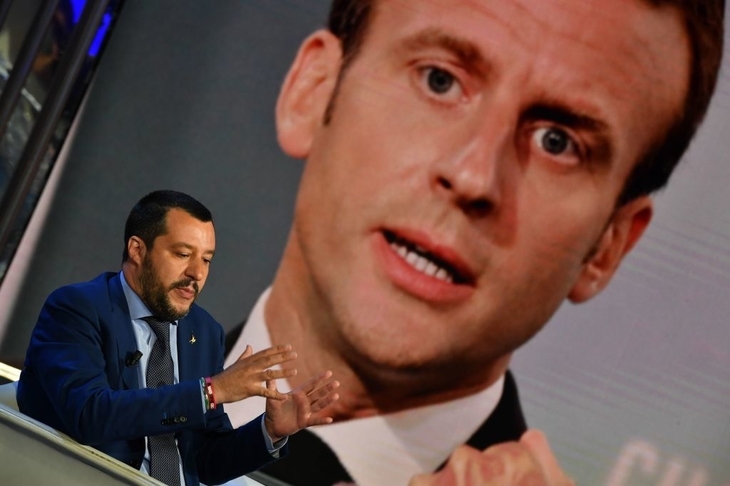When Emmanuel Macron won a resounding victory over far-right nationalist Marine Le Pen in the 2017 French presidential elections – claiming 66 per cent of the vote – Matteo Salvini was a little known Italian politician largely scoffed at as a clown by the status-quo parties. While Salvini was posting selfies on Facebook and making outlandish comments about North African migrants, the eurozone, the European Union, and the Italian political establishment, Macron was in Paris measuring drapes in the Élysée Palace. Stories in the Washington Post, the New York Times, and the Guardian gushing about Macron being Europe’s saviour from the dark forces of populism were as prevalent as stories deriding Salvini as a buffoon.
A year and a half later, the tables have turned. Emmanuel Macron is no longer the untouchable beacon of hope stopping the brutes from breaching Europe’s gates. His confidence levels among the French public have dipped to 26 per cent amidst scandal, cabinet resignations, and unpopular economic reforms. Meanwhile, back in Rome, Matteo Salvini is seeing his leverage increase with every controversial statement. And he’s using that leverage on every conceivable issue, from eurozone reform and Russia sanctions to migration. It is now Salvini who is sitting in a comfortable position, a fire-breathing provocateur who wakes up every morning seeing the poll numbers of his League party rise. At the beginning of the year, the League registered 13.1 per cent in public surveys; as of November 7, the number has more than doubled to 31.05 per cent.
Politics, as in life, can change at the drop of a hat. Numbers fluctuate, crises occur, and decisions are made that could severely impact the staying power of a politician or a party. Just ask German Chancellor Angela Merkel, whose decision in 2015 to welcome over a million refugees from the war zones of the Middle East has significantly hurt her credibility as a leader and very likely costed her CDU and CSU allies seats in the Bundestag. Or ask Swedish Prime Minister Stefan Lofven, who lost a no-confidence vote in September after his Social Democrats put up their worst election showing in a century.
There very well may come a time when Italy’s populist government begins to see its support chip away, something quite common in the circus otherwise known as ‘Italian politics’. At the moment, however, Matteo Salvini is winning his feud with Emmanuel Macron – not necessarily because the Italian has the power to mould Brussels to his will, but rather because he possesses just enough influence to gum up the EU machinery when he sees fit. If there is one message Salvini and his coalition partner, 5 Star’s Luigi Di Maio, hope to communicate to Italian voters, it’s that Italy is no longer a pushover, or weakling, at the EU’s mercy. It turns out that standing up for the Italian people and locking horns with EU commissioners is quite an effective political strategy.
It’s an indisputable fact that European politics are trending in a more populist direction. According to a report published this week from some of Europe’s top political scientists, the populist share of the vote has increased from a fringe seven per cent in 1998 to 25 per cent today. Twenty years ago, 12.5 million Europeans were living under a government with at least one populist cabinet member. In 2018, the figure is over 170 million, a thirteen-fold increase. Salvini no doubt hopes this impressive growth for the anti-establishmentarian ethos will continue far into the future. Indeed, given Salvini’s ambition, he likely aims to lead the continent-wide populist movement into the next decade.
As Macron waxes emotionally in front of world leaders during world war one ceremonies about Europe descending into the depths of a nationalist hell, Salvini is in his office in Rome preparing for next year’s EU parliamentary elections. The Frenchman and the Italian – two men with oversized egos and a sense of self-importance that borders on narcissism – won’t technically be on the same ballot. But make no mistake: Macronism and Salvinism will be. Next spring’s contest will be a brutal fight to the death, one that may reveal whether the multilateralist Macron or the uber-nationalist Salvini is the more powerful European leader.
It would be too hyperbolic a statement to refer to the 2019 EU elections as the final say on the matter. Politics has a tendency of evolving quickly. It could very well be the case that Matteo Salvini and his allies like Hungary’s Viktor Orban, Poland’s Law and Justice Party, the Sweden Democrats, Austria’s Freedom Party, and Germany’s AfD are but a fad in a particularly volatile time.
If Emmanuel Macron were smart, he wouldn’t make that gamble.






Comments